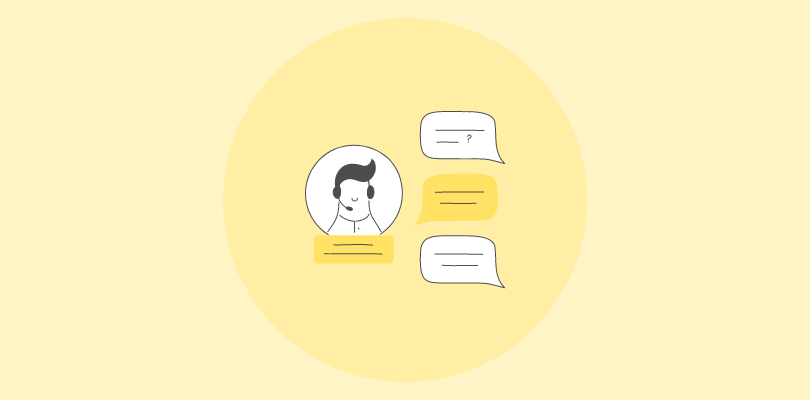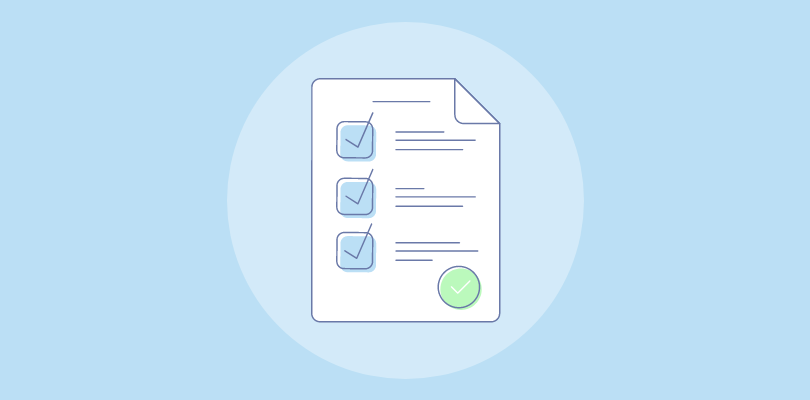The best career assessment tools do more than label personalities. They help people make clear, confident decisions about where to focus their time, skills, and energy.
While building a career program for mid-level professionals, I noticed that uncertainty often showed up after the learning began—not before. Some participants were progressing just fine but weren’t convinced the roles they were aiming for were the right fit. It wasn’t a skills problem; they needed the right career direction.
That’s why career assessments, when chosen well, can be a turning point. They surface patterns, reveal fit, and make the next step easier to act on.
In this guide, I’ve reviewed the best career assessment tools for 2026, focusing on what they’re good at, who they’re built for, and how to use them effectively.
Here’s a quick look at what’s included:
| Career Assessment Tools | Best For | Pricing |
|---|---|---|
| ProProfs Quiz Maker | Coaches & Trainers | Forever FREE for short quizzes and all essential features. Paid plans start at $19.99/month |
| Truity | Personality Tests | Starts at $9/person. |
| CareerExplorer | Workplace Assessments | Free for basic features. Custom pricing for the premium plan. |
| Bryq | Technical Career Assessments | Starts at $299/month. |
| Evalgator | K-12 Schools & Teachers | Starts at $2/user/month. |
| CareerFitter | Detailed Reporting | $19.95 for a one-time purchase. |
| O*NET Interest Profiler | Self-Assessment | Free (no customization features). |
| Keirsey | Understanding Core Temperament in Career Planning | Starts at $26.21. |
| 16 Personalities | Myers-Briggs Framework-Based Career Assessment | Free (basic reporting); premium reporting starts at $9. |
| PathwayU | Values-Based Career Guidance | Starts at $3,000/year. |
| Apt (tryapt.ai) | AI-Powered Career Matching | Available on request |
| HireVue | Career-Focused Screening in Hiring | Available on request |
| The Princeton Review’s Career Quiz | Quick Career Insights | Free (basic insights) |
My Top 3 Picks for the Best Career Assessment Tools
If you’re short on time and want a quick shortlist, these three tools stood out for their depth, usability, and ability to deliver meaningful career insights across different age groups and contexts.
ProProfs Quiz Maker
ProProfs Quiz Maker lets you create customized career assessments using 20+ question types and an AI quiz generator. It supports both personality and aptitude testing, helping users discover roles that align with their strengths and goals.
You can add multimedia to increase engagement and access detailed reports for tailored guidance. With built-in templates and 200+ expert-designed skill assessments, it’s ideal for fast, data-driven career insights.
CareerExplorer
CareerExplorer provides a detailed, multidimensional assessment covering personality, interests, values, goals, and work preferences. It matches results with over 800 career paths and allows users to filter options based on lifestyle factors like remote work or schedule flexibility.
The platform is well-suited for job seekers or professionals looking to evaluate new directions, with career data, salary insights, and education suggestions built into each recommendation.
Evalgator
Evalgator is designed for students and educators to explore career options through interest, skill, and personality assessments. It features student-friendly dashboards, instant reports, and gamified elements like badges and peer challenges.
The platform offers personalized suggestions and supports structured career discovery in school settings. Teachers can track progress easily, and learners stay engaged through an interactive, goal-oriented experience that turns early planning into an ongoing journey.
List of the Best Online Career Assessment Tools
This list of best career assessment tools is the result of hands-on testing, in-depth research, peer recommendations, independent reviews, and feedback from real users—including coaches, educators, and hiring professionals.
1. ProProfs Quiz Maker – Best for Coaches & Trainers
ProProfs Quiz Maker is one of the most flexible tools I’ve used for building career assessments that go beyond personality typing. It enables you to evaluate work styles, motivations, environments, and aptitudes—making it especially useful for coaching sessions, training programs, or workforce readiness initiatives.
What stands out is its support for both personality and skill-based assessments. You can use the scored quiz format to create tests that measure job-relevant knowledge or cognitive strengths, providing quantifiable results that are easy to interpret. The platform also includes access to 200+ prebuilt skill assessments designed by subject matter experts, saving you hours of content creation when you’re evaluating specific roles or industries.
The test creation process is highly customizable: add videos, images, or audio to keep learners engaged, especially in remote or younger audiences. With 20+ question formats and an AI-powered quiz generator, it’s quick to build tailored assessments that feel relevant and professional. Results are easy to analyze with built-in reporting that surfaces trends, identifies gaps, and supports personalized feedback.
Pros:
- Build fully customized career assessments that measure aptitude, personality, interests, and job fit across industries.
- Choose from 20+ question types, including scored, image-based, and scenario formats, for richer, more accurate evaluations.
- Deliver instant, personalized feedback with detailed result pages that guide next steps in career exploration.
- Generate tailored questions effortlessly with an intuitive, AI-powered quiz builder.
- Tap into a library of 200+ expert-designed skill and psychometric assessments and thousands of ready-to-use quizzes.
Cons:
- No dark mode available, which may affect usability in low-light settings.
- Lacks a downloadable/offline version for use without internet access.
Pricing:
Forever FREE for short quizzes and all essential features. Paid plans start at $19.99/month
2. Truity – Best for Personality Tests
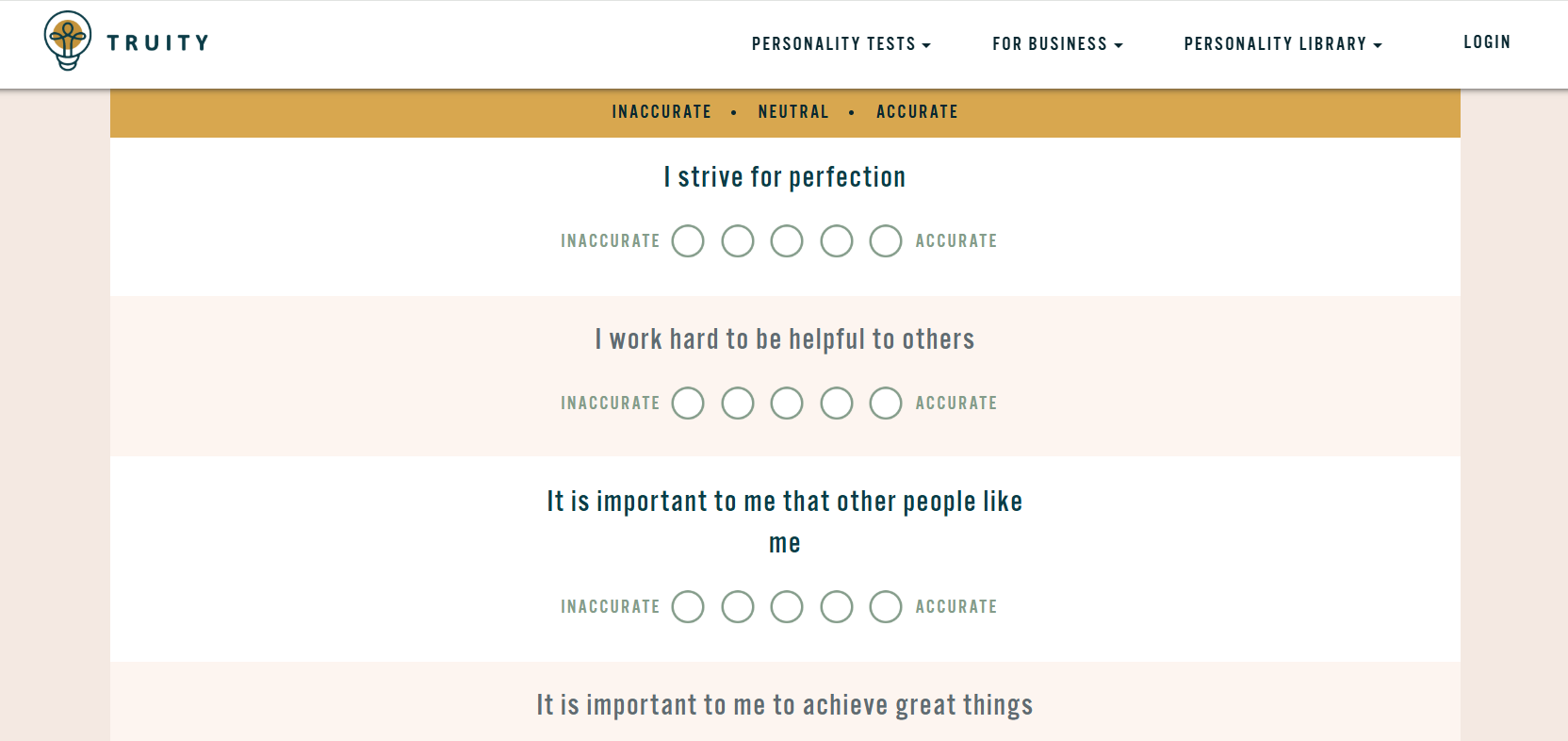
Image Source: Truity
Personality tests can offer more than surface-level insights. When done right, they can shape real career decisions. I’ve used Truity when I needed a quick, data-backed way to help someone understand how their personality connects to workplace roles—and it delivered.
What makes Truity one of the best career assessment tools is its range of assessments built on proven frameworks like the Big Five, Myers-Briggs, DISC, and the Enneagram. Each test gives you more than just a label—it highlights values, motivators, communication styles, and how those align with specific careers. I especially like how it avoids vague fluff and gives direct, role-relevant insights that are actually useful for coaching conversations.
It’s also one of the few platforms I trust for its scientific rigor. The assessments are regularly updated to reflect current research, and the reports are structured enough to support both individual decisions and group development programs. I’ve found it practical, scalable, and easy to integrate into coaching workflows.
Pros:
- Offer suggestions for suitable careers, work environments, and even potential challenges.
- Customized recommendations based on an individual’s specific personality profile.
- Compatible with mobile devices, allowing users to take assessments on smartphones and tablets.
- Free and premium personality tests and career assessments based on different models and theories.
- Personalized feedback, insights, and tips to improve self-awareness, communication, and decision-making.
Cons:
- Some tests require payment for the full report or additional features.
- Limited options for customizing the design and layout of quizzes.
Pricing:
Starts at $9/person.
3. CareerExplorer – Best for Workplace Assessments
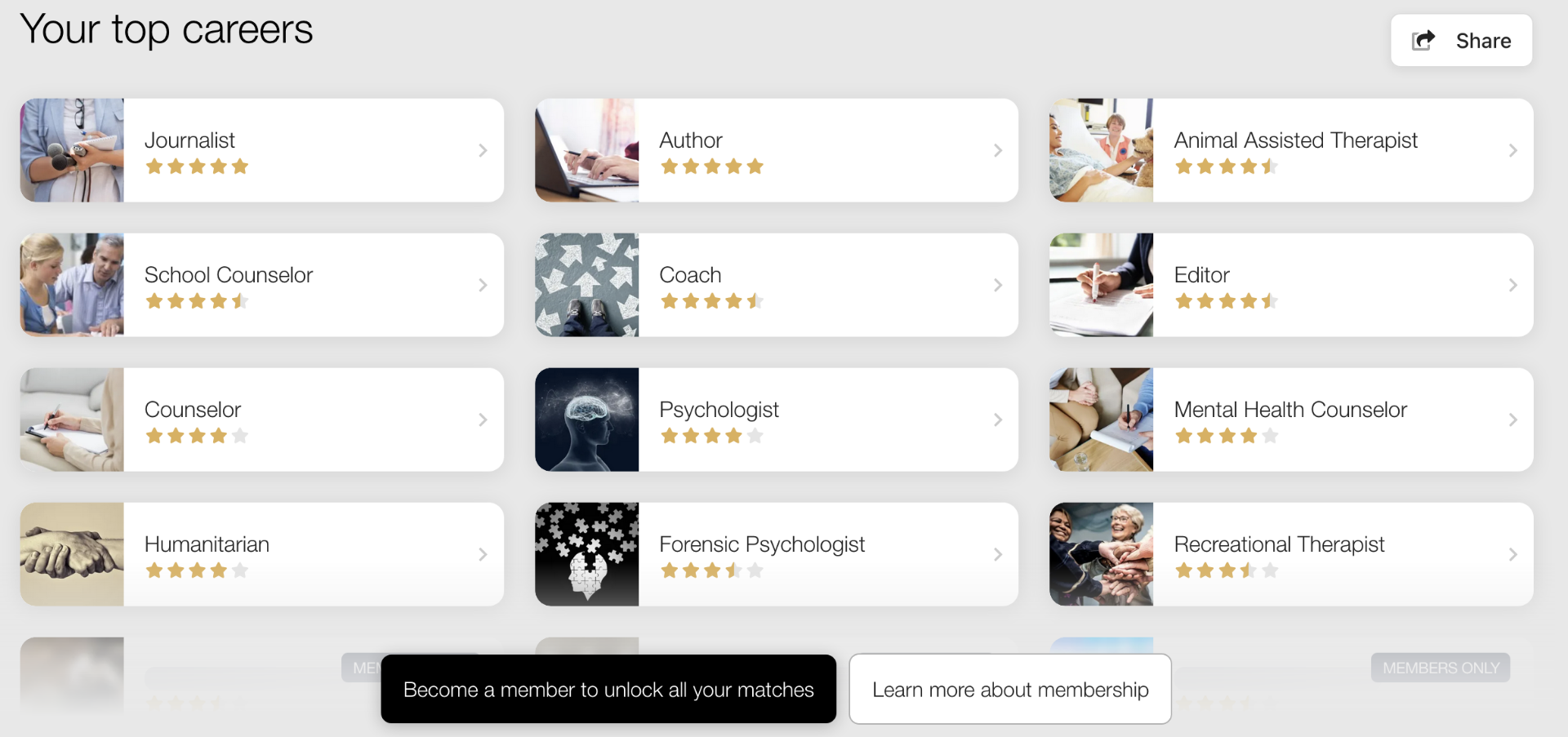
Image Source: Coaching-etudiant.net
I’ve worked with CareerExplorer to evaluate career alignment for professionals at various stages—including those already in the workforce. What stands out is its ability to assess five core dimensions: interests, personality, background, goals, and workplace preferences. The platform then maps these to a database of 800+ careers, ranked by compatibility.
Unlike tools that focus solely on interests or traits, this one includes filters for real-world factors like remote work, company culture, and work-life balance. That makes it more relevant for people evaluating not just what they want to do—but how they want to work.
The assessment can also be tailored for different industries or seniority levels, which I’ve found useful when structuring internal career development programs. Whether you’re supporting employees exploring lateral moves or advising individuals considering a shift, CareerExplorer provides the kind of data-rich output that supports long-term, values-aligned career planning.
Pros:
- Rich career profiles with insights on salary, education paths, required skills, growth outlook, and role expectations
- Smart matching engine that recommends careers based on five key personal dimensions, not just personality
- Intuitive interface with accessible UX for both individuals and career program facilitators
- Flexible enough to plug into long-term career development or reskilling initiatives
- Strong data privacy protocols and compliance with industry security standards
Cons:
- Lacks built-in coaching, mentorship, or interpretation support for deeper career guidance.
- It does not account for external variables like location, current education, or life stage, which limits real-world personalization in some cases.
Pricing:
Free for basic features. Custom pricing for the premium plan.
4. Bryq – Best for Technical Career Assessments
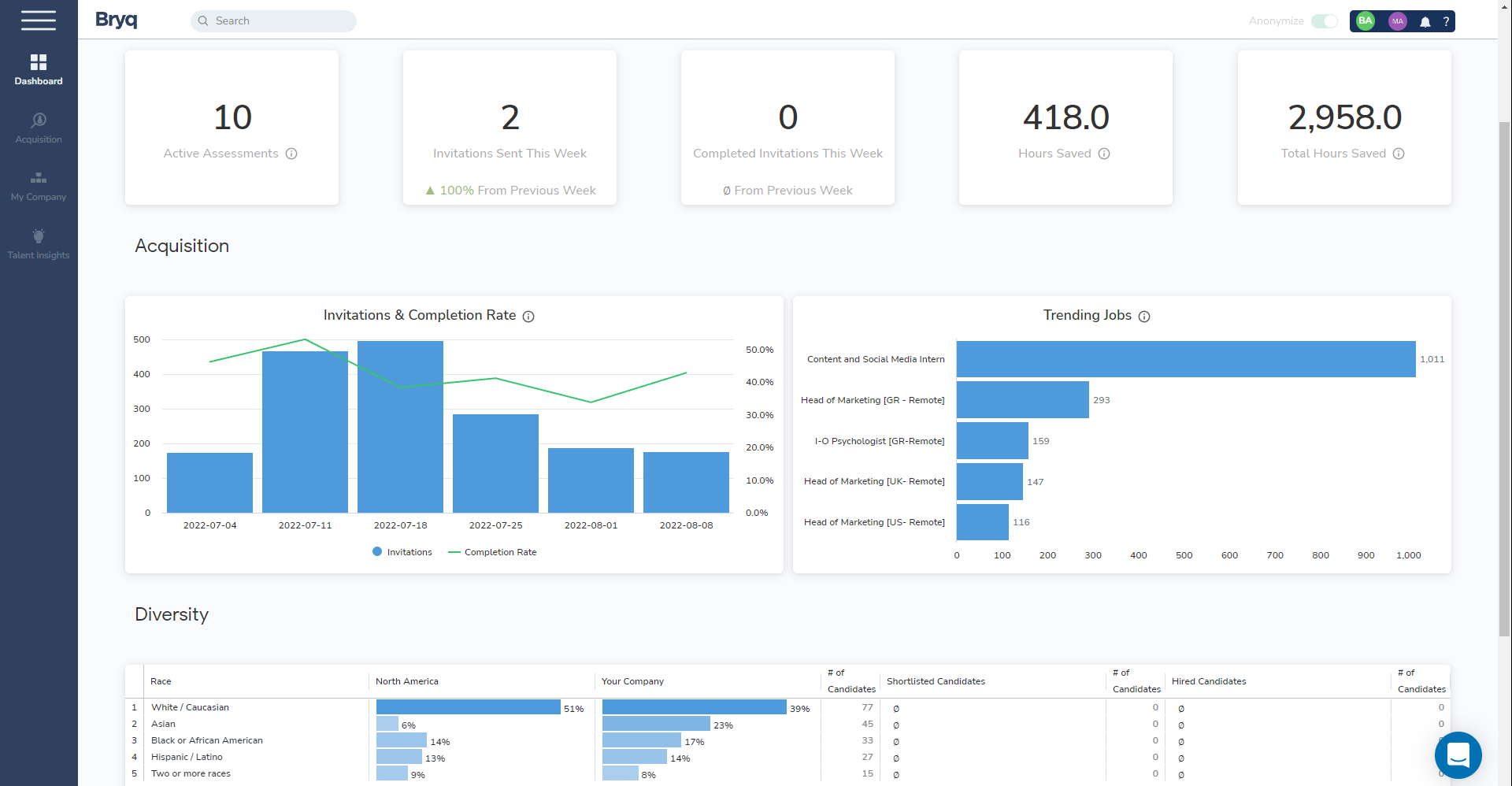
Image Source: Jobvite
Many online career assessment tools stop short when it comes to evaluating hard skills—but Bryq fills that gap. I’ve used it to build assessments specifically for technical roles, where the focus isn’t just on personality but on real-world, role-aligned competencies.
Bryq lets you create tailored tests for software development, IT, and technical problem-solving. It evaluates cognitive abilities like logic, numerical reasoning, verbal aptitude, and attention to detail—all critical for success in tech-driven roles.
What stands out for me is how its cognitive assessments simulate on-the-job scenarios, making the results much more relevant than generic quiz formats. Bryq also offers a wide range of role-specific assessments across programming languages and technical domains.
Importantly, it applies scientifically validated models to minimize bias. By focusing on skills and job-related abilities rather than subjective traits, it helps organizations make more equitable, data-driven hiring decisions.
Pros:
- Detailed reports and dashboards that show you the strengths and weaknesses of each candidate
- Minimized bias in the career assessment due to focus on job-related competencies instead of personal characteristics
- Track candidate performance and compare it against predefined benchmarks or ideal profiles.
- Customized interview guides based on assessment results to prepare for interviews.
- AI-powered tests to assess candidates’ cognitive skills for a more objective and data-driven way to assess candidates.
Cons:
- Limited integrations with certain applicant tracking systems (ATS), HR platforms, or existing tech stacks—manual workarounds may be needed
- Primarily optimized for technical and cognitive roles; less effective for evaluating soft skills or creative, client-facing positions.
Pricing:
Starts at $$299/month.
5. Evalgator – Best for K-12 Schools & Teachers
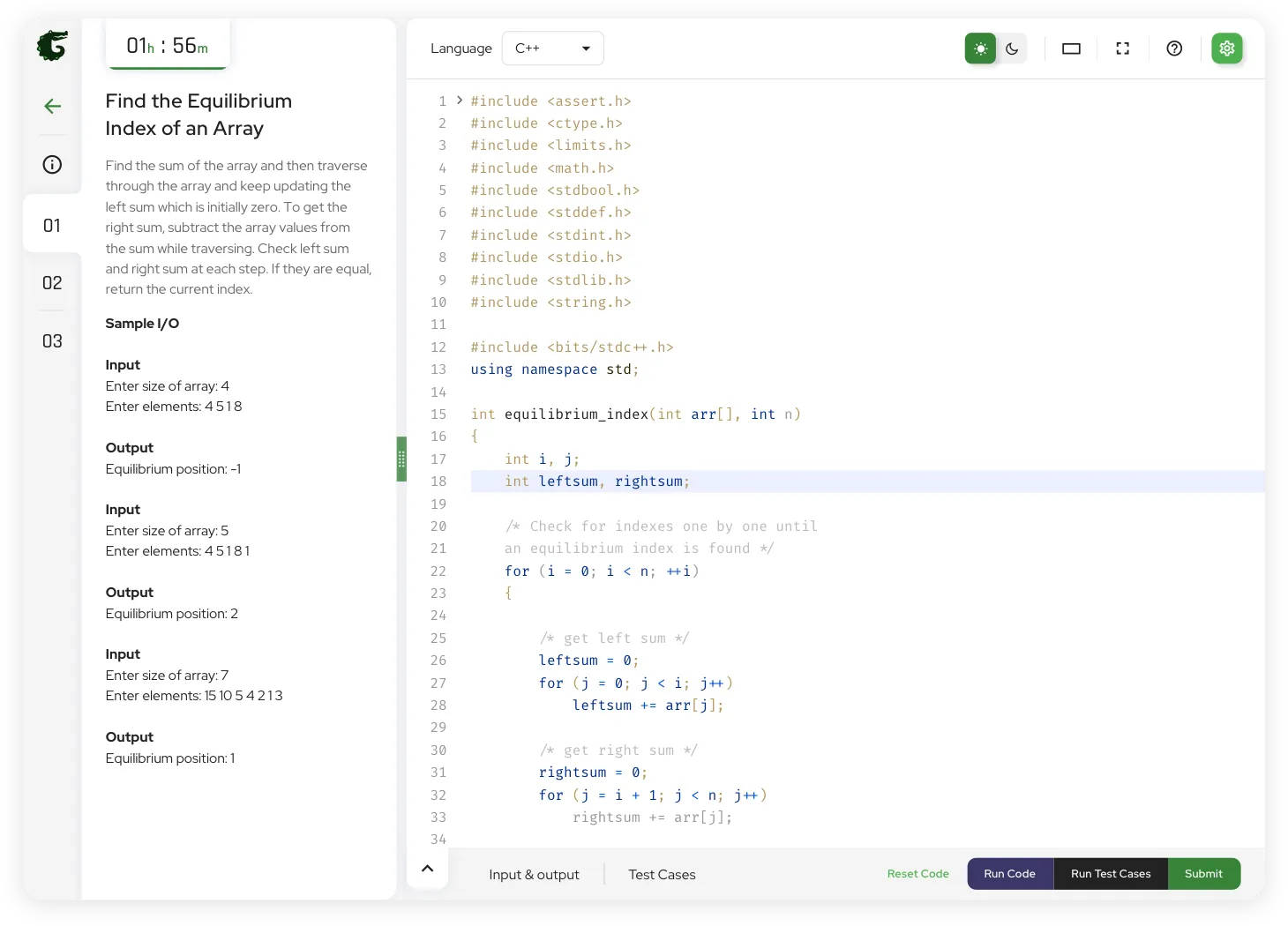
Image Source: Evalgator
Career assessment often begins during school years, and Evalgator is designed specifically with that audience in mind. When I explored the platform, what stood out was its wide range of assessments—personality, interest, aptitude, and skills—all geared toward younger learners and educators.
The interface offers separate dashboards for students and teachers, making it easy to access test results, track progress, and view recommended career paths or development plans. I also noticed how the system automatically generates tailored suggestions based on performance—removing the guesswork often associated with early guidance.
To keep the experience interactive, Evalgator adds gamified elements like badges, leaderboards, and peer challenges. These features felt thoughtfully implemented—not gimmicky—and could realistically boost student motivation.
Overall, the platform gives educators a structured tool to explore potential and helps students stay curious and engaged as they think about what comes next, making it one of the best career assessment tools for educational contexts.
Pros:
- Customized assessments based on difficulty level, duration, and format of the tests.
- Instant feedback and reports to both the candidates and the instructors after each assessment.
- Remote proctoring and security features like webcam monitoring, browser lockdown, plagiarism detection, and IP tracking.
- Easy integration with popular learning management systems such as Moodle, Canvas, Blackboard, and Google Classroom.
- Strong data privacy and security measures to protect the sensitive information of candidates and instructors.
Cons:
- The built-in question library lacks depth in specialized or technical subjects, which may limit flexibility for advanced assessments.
- Reporting features are functional but basic; lacks visual analytics or deeper performance breakdowns.
Pricing:
Starts at $2/user/month.
6. CareerFitter – Best for Detailed Reporting
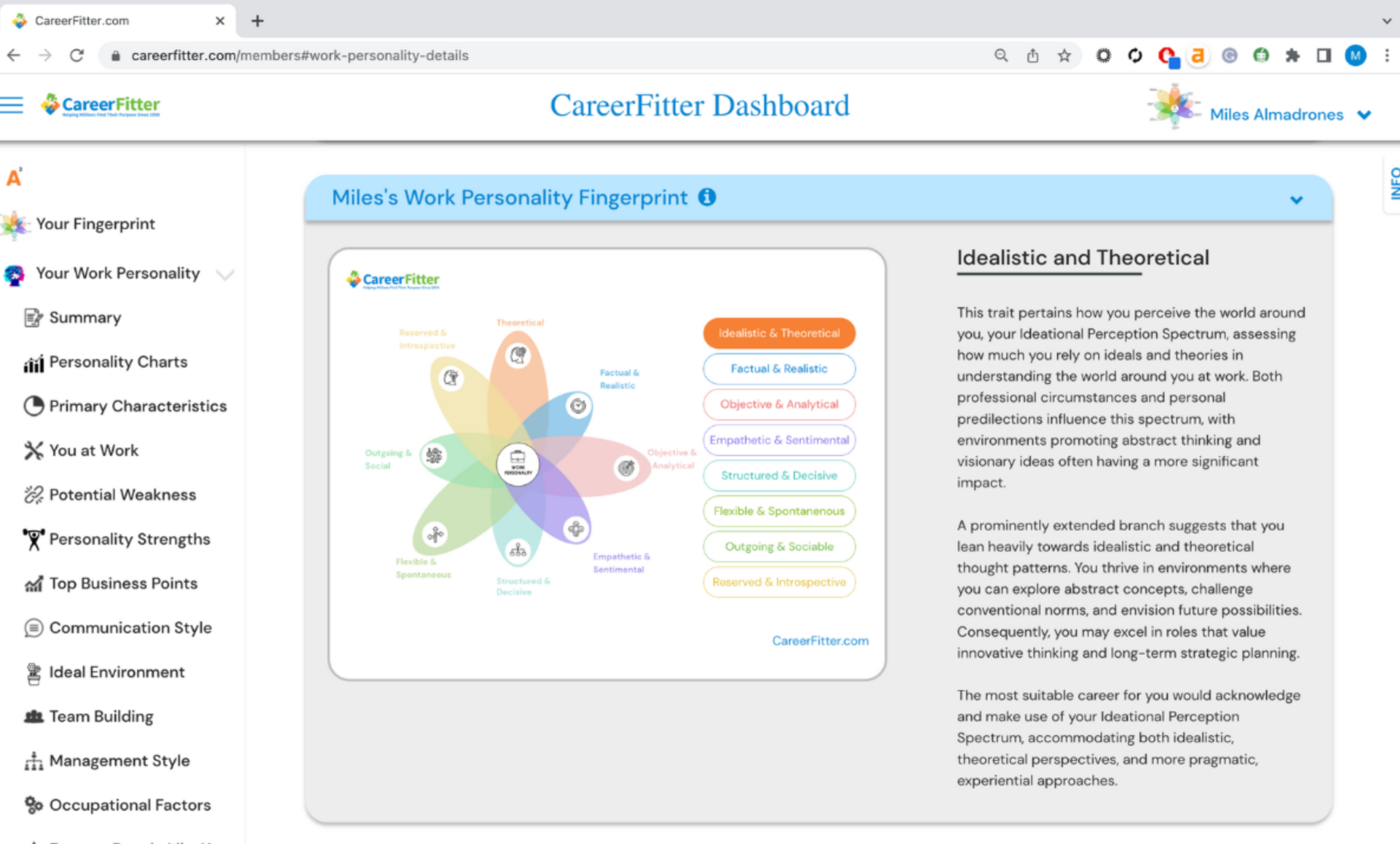
Image Source: scholarshipinstitute.org
CareerFitter is one of the most structured career assessment tools for adults, especially when it comes to reporting depth. When I explored the platform, what impressed me was the dual-test system—one measuring eight core work personality dimensions, and the other focused on preferred work environments. Together, they provide a well-rounded picture of professional fit.
The tool matches your profile with over 1,000 career options and layers in salary data, video overviews, and active job listings, giving each suggestion more context. The reports are dense but well-organized, covering traits like introversion vs. extroversion, emotional stability, openness, and decision-making style.
Beyond the main assessment, you also get access to charts, secondary tests, and additional tools for deeper career exploration. Several users I’ve spoken with noted its consistency and accuracy—making it a strong option for those looking to combine self-awareness with practical next steps.
Pros:
- Career matching feature to match an individual’s personality traits with suitable career options.
- Visual depiction of your work personality strengths and a detailed analysis of how the work energy, behavior, and decisions are influenced.
- Include personality fingerprints within the CV, or share and compare it with colleagues.
- Offers additional resources such as articles, guides, and career planning and development tips.
- Quick customer support to address any questions or concerns about the assessment or its results
Cons:
- The free summary doesn’t give any useful information about personality or career options.
- Doesn’t consider the education, skills, experience, or interests that affect the career choices.
Pricing:
$19.95 for a one-time purchase.
7. O*NET Interest Profiler – Best for Self-Assessment
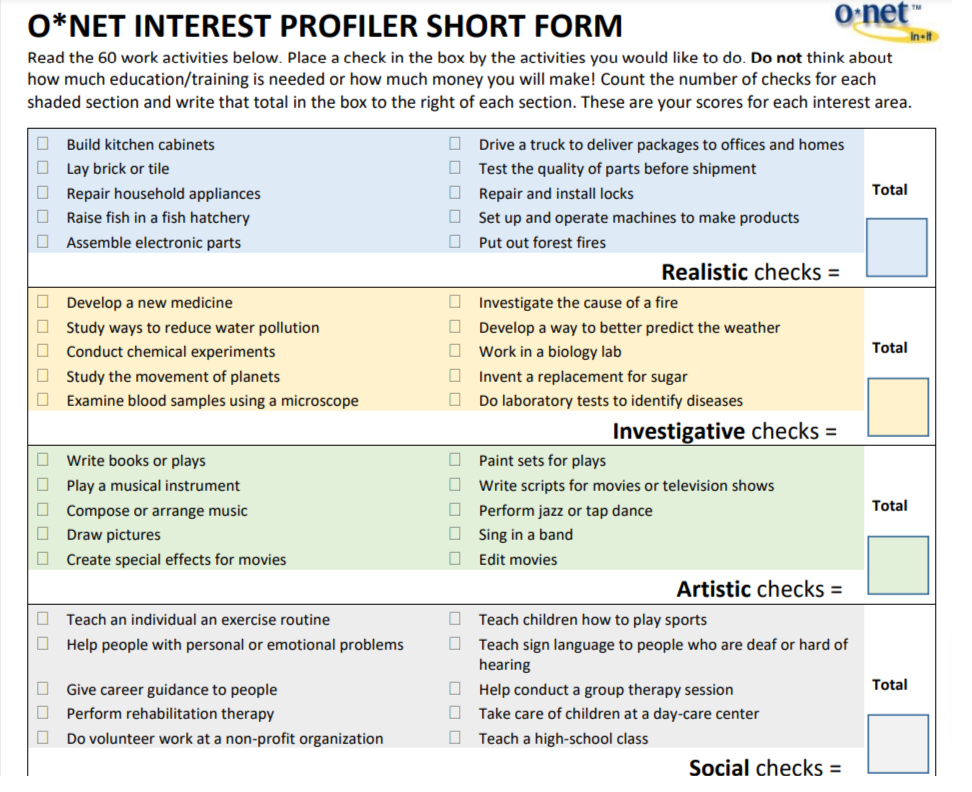
Image Source: onetcenter.org
The O*NET Interest Profiler is a free, government-backed career assessment tool that helps individuals identify work preferences and connect them to matching careers. It organizes interests into six broad categories—like social, investigative, or realistic—and suggests careers based on how closely a person’s preferences align with these domains.
What stood out to me while testing it was its simplicity and clarity. The assessment is straightforward, making it easy to integrate into career exploration programs for schools, workforce agencies, or nonprofits. It uses data from the comprehensive O*NET job database, ensuring that the career suggestions are current and grounded in real labor market insights.
Though the tool doesn’t assess skills or personality traits, it’s one of the best career assessment tools for starting a career conversation, especially when cost, accessibility, and objectivity matter. If you’re creating assessments at scale or guiding students or job seekers, it’s a reliable, no-frills solution.
Pros:
- Free and beginner-friendly—perfect for educators, counselors, and job seekers on a budget
- Effective starting point for guided career discussions, especially at early stages of exploration
- Offers structured, interest-based matches linked to real job roles from the reliable O*NET database.
- Its simple interface makes it easy to use in classrooms, training sessions, or workshops.
- Can be embedded or integrated into websites and platforms, making it adaptable for scalable career programs.
Cons:
- Limited to interest-based results, doesn’t dive deep into personality or skills.
- Lacks customization for tailoring the test to specific job roles or industries.
Pricing:
Free (no customization features)
8. Keirsey – Best for Understanding Core Temperament in Career Planning
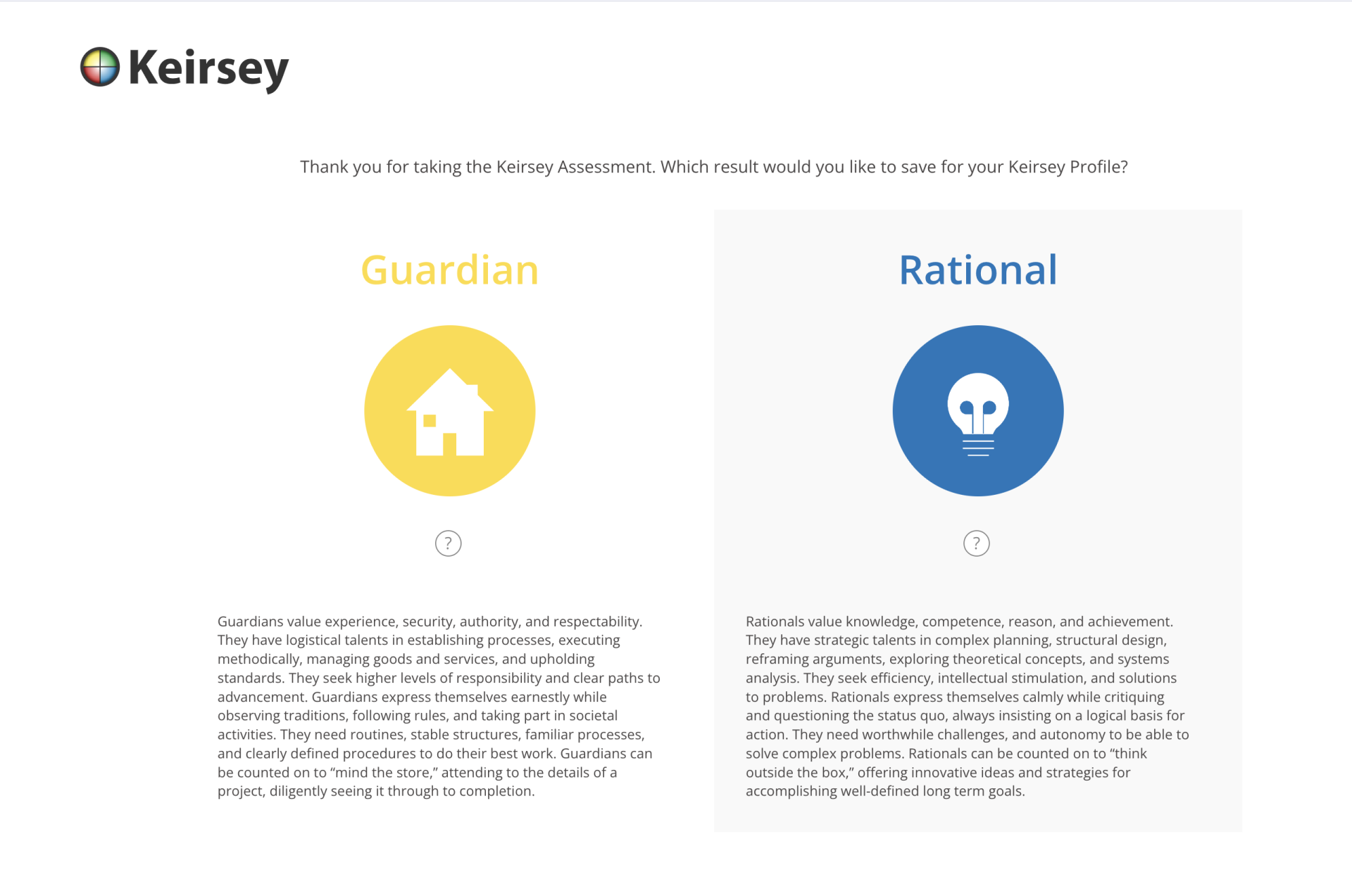
Image source: intelligent.com
The Keirsey Temperament Sorter, grounded in David Keirsey’s temperament theory, identifies individuals as one of four core types—Artisan, Guardian, Idealist, or Rational—and ties each to meaningful workplace traits. Unlike personality tests that focus on abstract labels, Keirsey emphasizes observable behavior, offering a practical framework for career guidance and team development.
What stood out to me is how clearly the results map to real-world attributes—like how someone communicates, solves problems or responds to structure. The 70+ question assessment takes time, but the insights are worth it. The career suggestions aren’t generic. They reflect motivational patterns and behavioral tendencies that shape success in different roles.
If you’re designing assessments for coaching, development, or hiring, this tool provides a structured, research-backed approach to understanding how temperament influences career fit without the guesswork or surface-level advice.
Pros:
- Classifies individuals into four temperaments for easy categorization and understanding.
- Matches temperaments with specific career paths, streamlining career coaching or placement processes.
- Offers comprehensive reports with clear career recommendations based on temperament type.
- Helps identify ideal work environments for individuals based on personality insights.
- Provides long-term value through a deeper understanding of personality dynamics in work settings.
Cons:
- The 71-question assessment can take time, making it less suited for quick evaluations.
- Does not account for external factors like experience or specific job skills.
Pricing:
Starts at $26.21
9. 16 Personalities – Best for Myers-Briggs Framework-Based Career Assessment
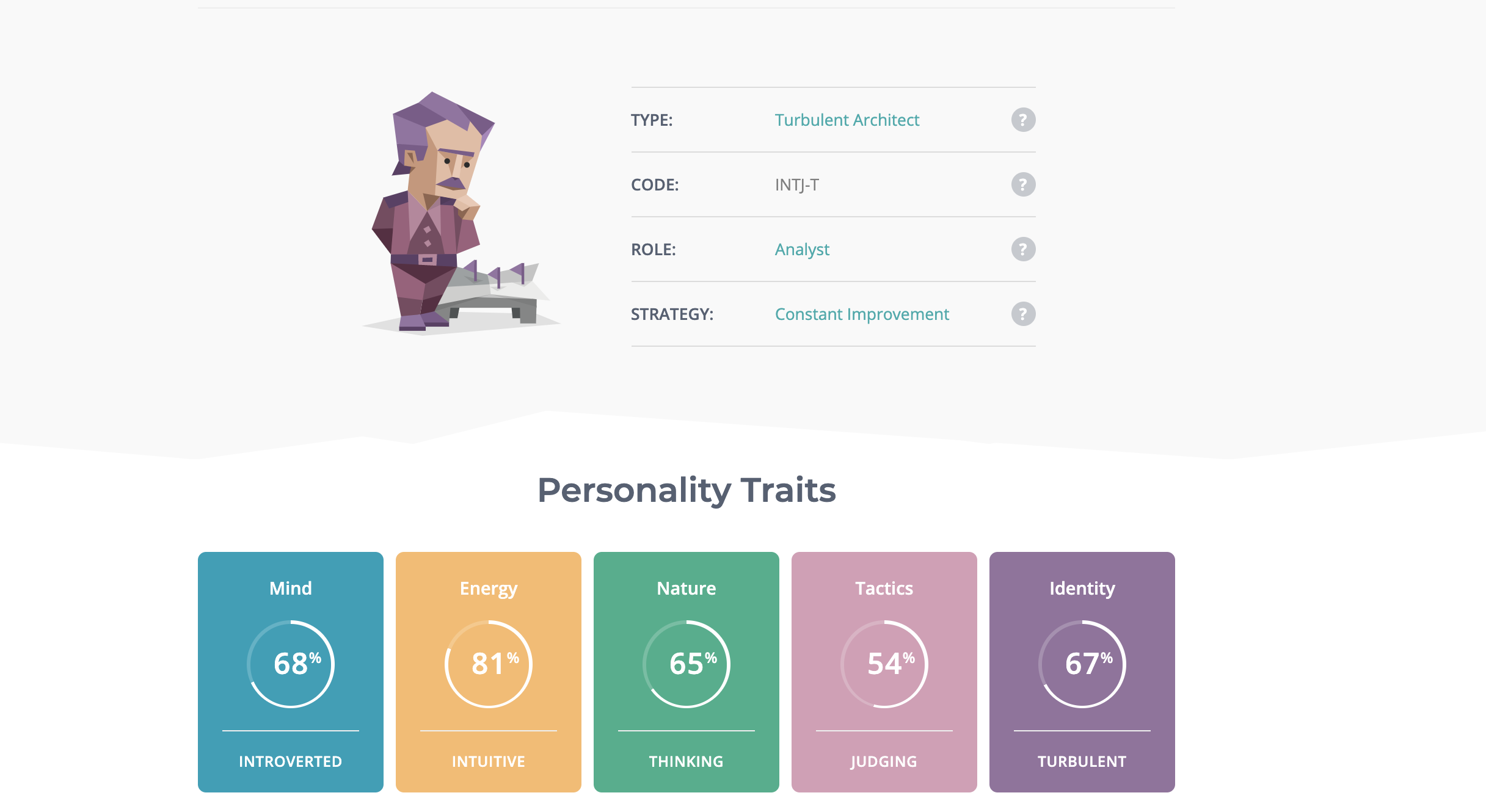
Image Source: developerexperience.io
The 16 Personalities test, built on the NERIS Type Explorer® and inspired by the Myers-Briggs typology, sorts individuals into one of 16 distinct personality types—like Architect, Campaigner, or Logician. I’ve used it to explore how different personality types play out in real-world scenarios, and I’ve always found the interface clean and intuitive. The statement-based format makes it easy to complete, even for someone new to assessments.
What I appreciate most is how the feedback doesn’t stop at labeling a type. It offers rich detail across work behavior, communication style, emotional tendencies, and personal growth—making it relevant for both self-awareness and career planning. It’s especially useful when guiding others to reflect on team dynamics or workplace preferences.
The free version delivers substantial insights, while the premium upgrade unlocks deeper content. That extended view came in handy when I needed to explore more nuanced patterns in personality.
Pros:
- Easy-to-use, based on the reliable Myers-Briggs typology, making results easy to interpret.
- Provides detailed reports covering career advice, relationship insights, and personal strengths and weaknesses.
- Clear, actionable insights into workplace behavior, making it a useful tool for professional assessments.
- Fast completion time of around 10 minutes, ideal for quick evaluations.
- The free version gives substantial details, with a premium option for those seeking deeper analysis.
Cons:
- Lacks dedicated career coaching or additional development resources.
- The basic version may not explore personality traits as deeply as some users might prefer.
Pricing:
Free (basic reporting); premium reporting starts at $9.
10. PathwayU – Best for Values-Based Career Guidance
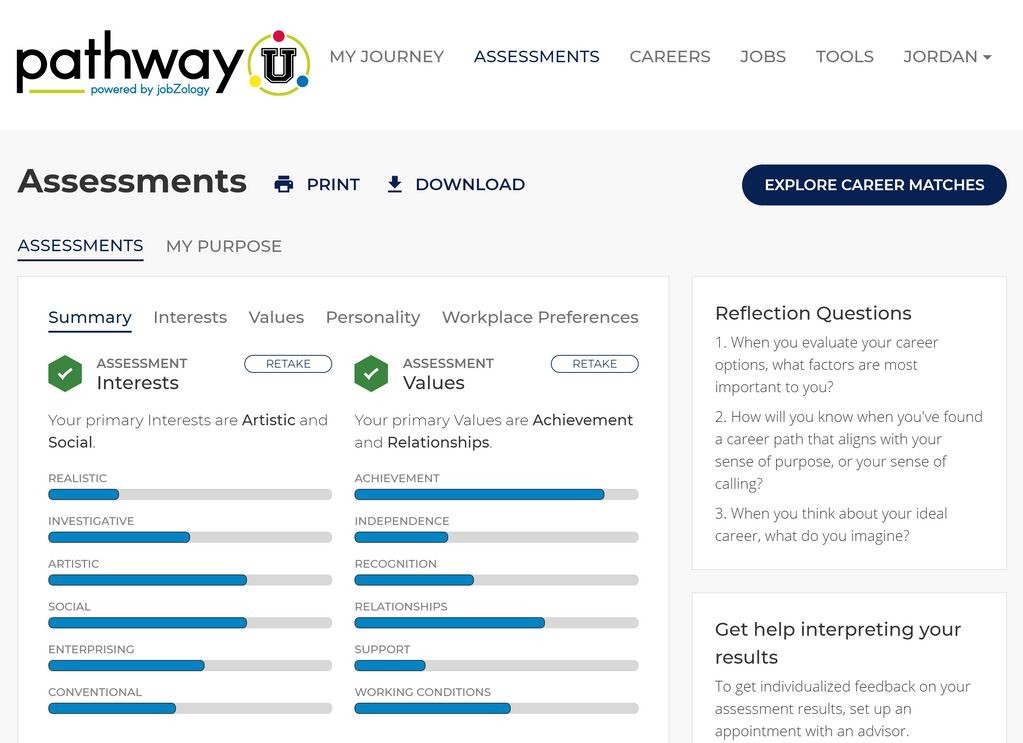
Image Source: EdTech Impact
PathwayU is a career assessment tool built with a clear mission: to help individuals discover careers that align not only with their skills and interests but also with their core values and sense of purpose. Grounded in vocational psychology, it’s widely used by universities, career centers, and mission-driven organizations looking to offer more than just surface-level guidance.
What differentiates PathwayU is its multi-dimensional approach. It combines assessments across interests, personality, values, and work environment preferences to generate personalized career matches. The results go beyond labels—users get a ranked list of aligned occupations, plus interactive tools that surface salary data, required education, and long-term job outlooks.
In my experience exploring the platform, it felt like one of the best career assessment tools for coaches working with students, graduates, or anyone seeking mission-aligned career direction. Its design and content are clearly geared toward academic, nonprofit, and workforce development settings where purpose matters as much as placement.
Pros:
- Built on vocational psychology principles to match careers with personal values, purpose, and long-term fulfillment
- Offers a unified assessment experience covering interests, values, personality, and workplace preferences
- Provides an interactive dashboard with real-time job market data, salary ranges, and educational pathways
- Seamlessly integrates with advising systems used in colleges, universities, and career centers
- Widely adopted by U.S. educational institutions and workforce development organizations for structured career guidance
Cons:
- Lacks tools for evaluating technical skills, job-specific competencies, or hiring readiness
- Access is limited to institutional partnerships, making it unavailable for independent users or small-scale use cases
Pricing:
Starts at $3,000/year.
11. Apt (tryapt.ai) – Best for AI-Powered Career Matching
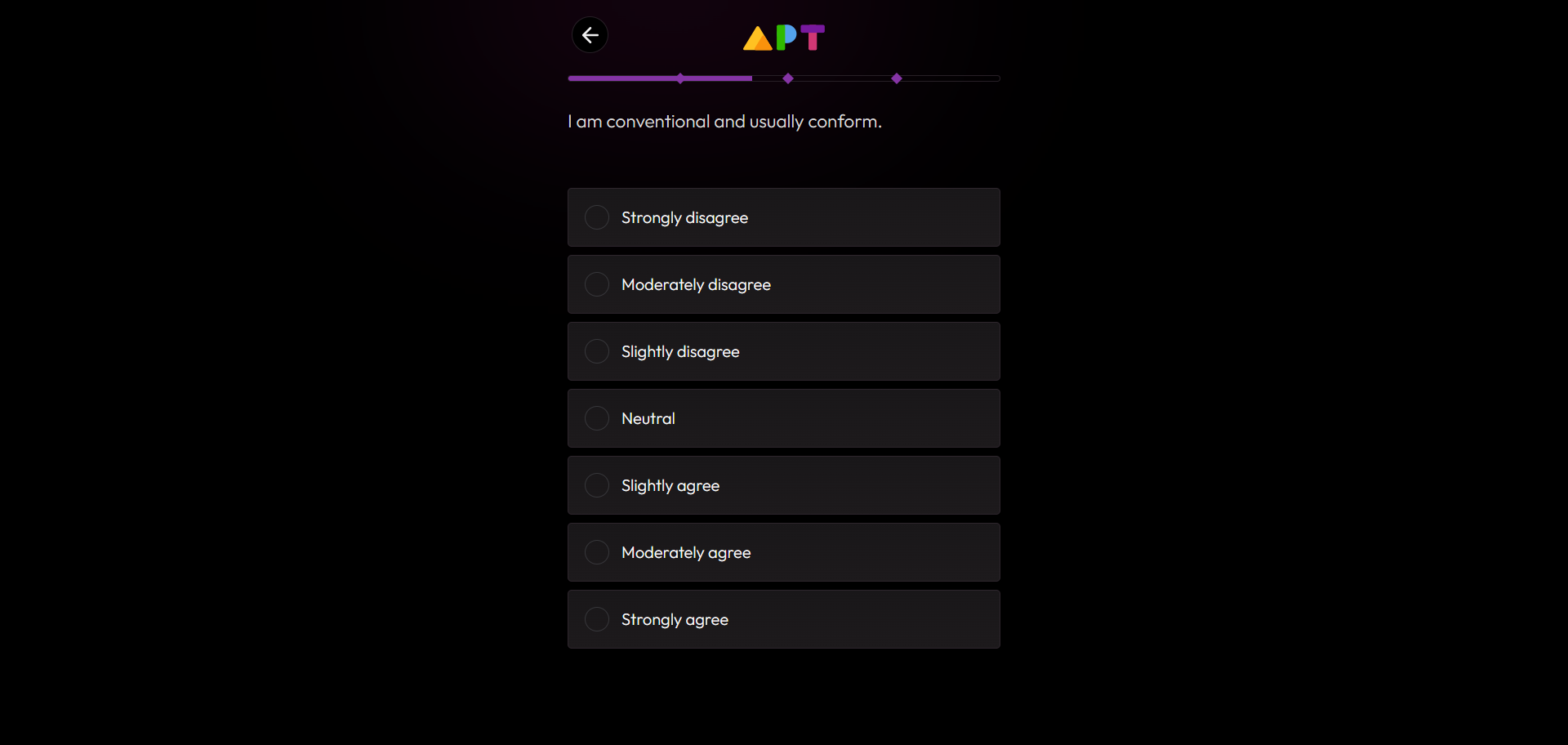
Image Source: Apt
Apt is a forward-thinking, AI-driven career assessment platform that merges several psychological models—including MBTI, Big Five, Enneagram, DiSC, and Holland Codes—into one cohesive and interactive experience. What makes Apt stand out is its built-in AI career coach, which responds to follow-up questions in real time, helping users understand their results, explore career directions, and pinpoint personal development goals.
It’s particularly effective for coaches and organizations seeking a modern, tech-enabled solution that doesn’t require juggling multiple tools. After the assessment, users receive a multi-layered report that blends personality, motivation, and behavior insights with tailored career suggestions. I found the experience refreshingly dynamic—the UI is slick, fast, and clearly designed for digital-native audiences.
Apt is best suited for career professionals aiming to deliver guided, high-context conversations—and for users who want a deeper, more nuanced alternative to static personality tests.
Pros:
- AI-powered career coach enables real-time, conversational support for interpreting results and exploring next steps
- Combines MBTI, Big Five, Enneagram, DiSC, and Holland Codes into a unified, multi-layered profile—no need to toggle between tools
- Mobile-first, visually polished interface appeals to digital-native users and modern coaching practices
- Enables deeper self-awareness and career alignment by blending personality, values, and motivation insights
- Well-suited for career professionals seeking an all-in-one, interactive experience for clients who expect instant, intelligent feedback
Cons:
- The AI coach may feel less personal or empathetic compared to talking with a real career advisor.
- Recommendations depend on how accurately users answer the questions. Vague answers can lead to mixed results.
Pricing:
Available on request
12. HireVue – Best for Career-Focused Screening in Hiring
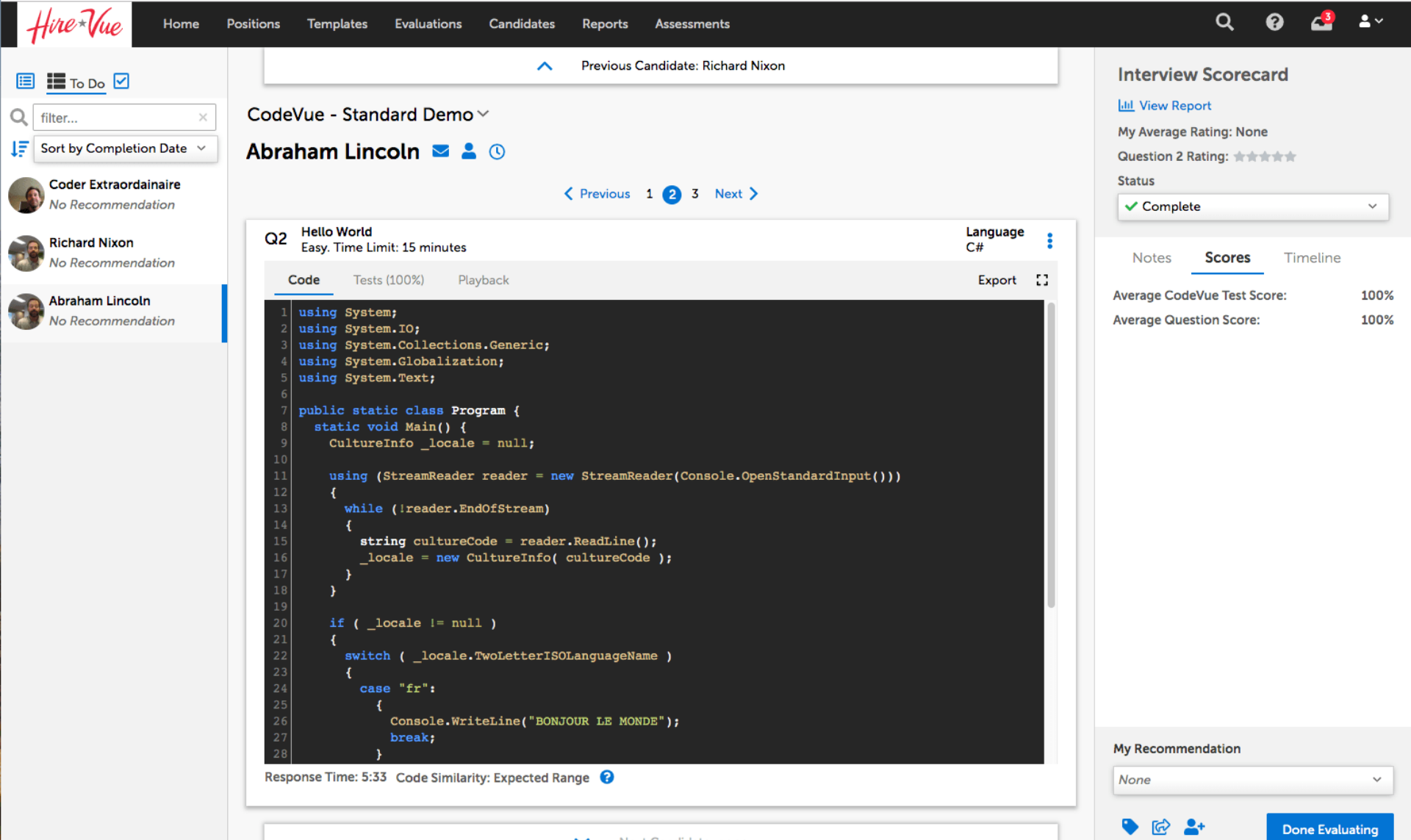
Image Source: HireVue
HireVue helps employers understand how candidates approach work by using short, research-based games and structured video responses. These assessments measure traits like memory, focus, problem-solving, and emotional control—key indicators of how someone might perform in a role.
The tool is often used at the start of the hiring process to identify fit for different career paths. By combining cognitive data with communication cues from video interviews, it gives hiring teams a clearer picture of where a candidate’s strengths lie and how they might grow in a role over time.
HireVue is especially useful for organizations that want to assess not just whether someone can do the job, but what kind of work they’re likely to do well—and enjoy. It’s a practical tool for making early career decisions, spotting leadership potential, or guiding internal movement into better-aligned roles.
Pros:
- Live or on-demand video interviews with candidates using a web browser or a mobile app.
- Pre-built or custom assessments that can be integrated with video interviews or delivered separately.
- AI and chatbots to automate screening, scheduling, communication, and evaluation.
- Seamless integration with various applicant tracking systems (ATS), human resource information systems (HRIS), and other software platforms.
- Interview scheduling feature to allow candidates to choose interview times.
Cons:
- Relatively expensive and complex system that may not be suitable for individuals and small businesses
- The AI scoring system may not perform equally across diverse candidate groups, with limited visibility into how evaluations are made.
Pricing:
Available on request
13. The Princeton Review’s Career Quiz – Best for Quick Career Insights
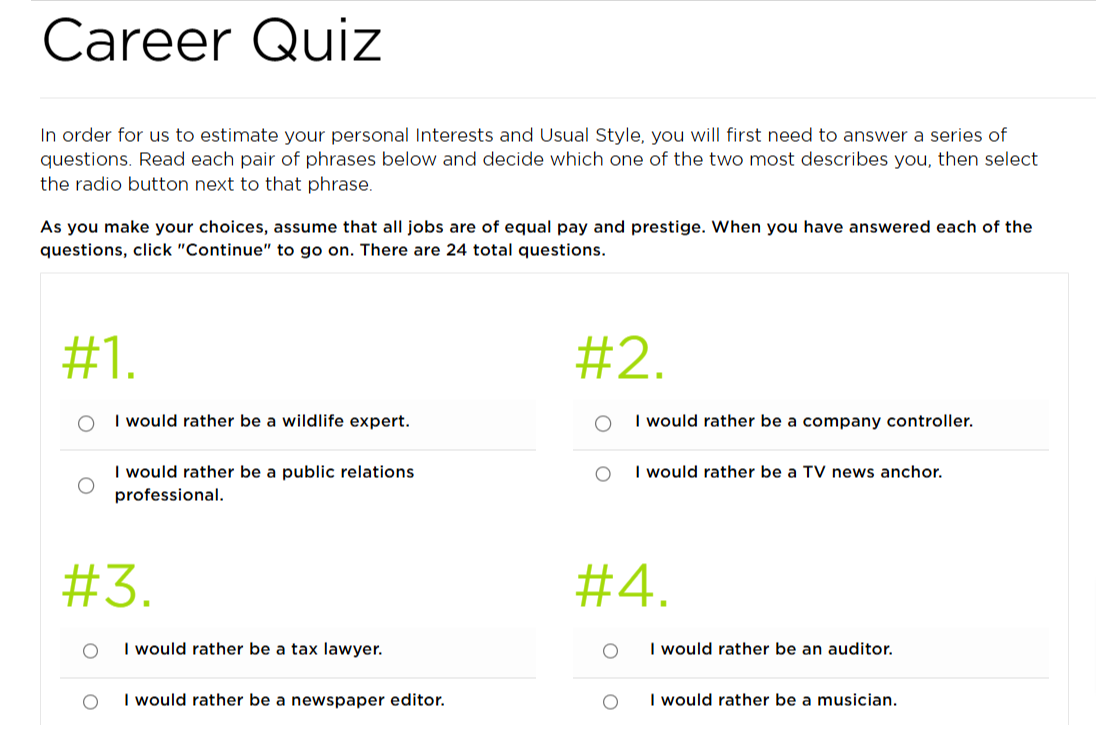
Image Source: princetonreview.com
The Princeton Review’s Career Quiz offers a free, 24-question “would you rather” format that takes about five minutes to complete. Users choose between paired statements—such as preferring clerical work or carpentry—to surface patterns in interests and work style. Results are color-coded across four categories: expediting, planning, communicating, and administering, each reflecting a different approach to work.
Although it’s fast and user-friendly, the insights are relatively broad and surface-level. Some users report that while the quiz offers a fun snapshot of preferences, it may not provide enough depth for serious career planning.
That said, it’s a helpful entry point for students or early-career individuals looking to start thinking about potential paths. It also includes a “day-in-the-life” view for each suggested career, offering a basic sense of what those roles involve. This makes it a practical choice for quick, low-pressure career exploration.
Pros:
- Short, structured quiz that takes under 5 minutes—ideal for quick career exploration
- Uses a simple, color-coded system to identify dominant work styles and preferences.
- Offers career suggestions matched to each profile, with descriptions to explore further.
- Great for early-stage users seeking low-pressure guidance on career direction.
- Provides access to additional tools and planning resources after completing the quiz.
Cons:
- The quiz is relatively short, so it may not dive as deeply into your personality or skills compared to other tools.
- Results may feel oversimplified for users seeking deeper analysis or more detailed guidance.
Pricing:
Free (basic insights)
How We Selected the Best Career Assessment Tools
We chose these tools based on a hands-on, experience-backed approach that prioritizes both practical application and user value. Our selection process focused on six key factors:
- User Feedback & Sentiment: We examined authentic reviews and discussions across communities and platforms to understand what real users appreciate—and where tools fall short.
- Feature Depth & Relevance: Each tool was evaluated for its ability to assess key career-aligned traits—like aptitudes, interests, personality types, and work preferences.
- Ease of Use: We looked at the overall user experience, including how intuitive the platform is for both creators and participants, from setup to analysis.
- Support & Resources: The availability of onboarding guides, live support, and help centers factored into our evaluation, especially for first-time users and teams.
- Pricing Fairness: We reviewed plans for transparency and scalability, factoring in the balance between what’s free, what’s paid, and what adds real value.
- Direct Experience & Expert Insight: Our own trials, plus insights from coaches, educators, and hiring managers, shaped the final list to ensure relevance across multiple audiences.
The result? A curated lineup of reliable, well-rounded tools that deliver measurable impact across education, coaching, and workforce development.
Benefits of Career Assessment Tools
The best career assessment tools are more than just personality quizzes. They’re decision-making accelerators for individuals and strategic assets for organizations.
Whether you’re guiding a student, coaching a mid-career pivot, or hiring for long-term fit, these tools offer clarity where instinct falls short. Based on our research, here are the most valuable benefits:
1. Clarity for Individuals
These tools help people identify their strengths, motivators, and blind spots—factors often overlooked in traditional career planning. With data-backed insights, users can make confident decisions about direction, development, or a fresh start.
2. Better Career Matches
Instead of relying on job titles or guesswork, assessments align personality traits, values, and aptitudes with meaningful work. This reduces trial-and-error job switching and helps individuals find roles that fit both skill and identity.
3. Smarter Hiring & Internal Mobility
For employers, assessments provide a standardized, fair way to evaluate candidates beyond resumes—especially for soft skills, work style, and long-term potential. They also surface overlooked internal talent for reskilling and leadership roles.
4. Reduced Bias and Improved Fairness
When built and applied responsibly, career assessments reduce hiring bias and create more inclusive evaluation frameworks—particularly when they’re science-backed and focus on skills, not just personality labels.
5. Personalized Coaching and Development
Whether you’re an educator, manager, or coach, these tools offer a starting point for deeper conversations and personalized action plans. The best platforms also integrate reporting and insights that support long-term growth, not just one-time results.
6. Stronger Retention and Engagement
When people feel aligned with their work, they stay longer and contribute more. Assessments help match roles with intrinsic motivators, leading to higher job satisfaction and lower attrition.
7. Better Team Dynamics
Understanding different work styles and decision-making tendencies helps build stronger, more collaborative teams. Assessments offer shared language and frameworks that improve communication and reduce friction.
FREE. All Features. FOREVER!
Try our Forever FREE account with all premium features!
Limitations of Career Assessment Tools (and How to Use Them Responsibly)
Career assessment tools can surface patterns and guide exploration, but they’re not definitive answers. Despite their usefulness, they come with limitations that coaches, educators, and individuals should keep in mind.
1. They’re Directional, Not Prescriptive
A career assessment is designed to point you toward potential paths—not hand you a blueprint. Many tools surface recurring traits or interests, but that doesn’t mean you’re only suited for one kind of work. People evolve, and so do their goals.
Tip: Use the results to explore possibilities, not to lock someone into a label.
2. Context Is Missing
Most tools don’t account for real-world constraints or life circumstances—like financial needs, location, education, or access to resources. They also rarely incorporate current job market trends unless explicitly linked to updated databases.
Tip: Supplement assessments with market research, career coaching, or informational interviews to get a full picture.
3. Quality Varies Widely
Not all tools are created equal. Some are backed by solid psychology and research; others feel more like entertainment. Free tools may skip scientific validation, while paid ones can hide insights behind upsells.
Tip: Look for tools with transparent methodologies and peer or institutional trust. Don’t assume price equals value—or that free tools are useless.
4. One Test Can’t Cover Everything
Interests, aptitudes, personality, values, and emotional tendencies all shape career fit. Most tools only cover one or two of these areas. That’s why results can feel contradictory or incomplete.
Tip: Use more than one type of assessment, then compare results to find common threads or standout insights.
5. They Can Reflect Biases
Even science-backed tools can carry cultural, linguistic, or socioeconomic bias—especially if they’re not regularly updated or validated across diverse populations. AI-driven tools may also inherit bias from training data.
Tip: Be cautious about making high-stakes decisions based on one data point. Use assessments as a starting point, not a filter.
Create Assessments That Drive Real Career Decisions
Career assessments are most effective when they lead to action, not just awareness. The best career assessment tools help people navigate choices, recognize patterns in their strengths, and take the next step with confidence. For coaches, educators, and HR teams, it’s also about delivering insights that are easy to interpret and apply.
ProProfs Quiz Maker offers the structure and flexibility needed to design assessments that feel both personal and professional. With AI-assisted quiz generation, customizable templates, and detailed reporting, you can create assessments that go beyond generic results. It’s quick to set up, simple to use, and the free plan covers everything you need to get started.
If your goal is to create career assessments that actually shape decisions and spark progress, ProProfs gives you the tools to make that happen without overcomplicating the process.
Frequently Asked Questions
What method should I use for career assessment?
The best method depends on your goal. For broad career discovery, use personality and interest-based tools. For skill-specific roles, focus on aptitude or technical assessments. Many professionals combine both. Tools like ProProfs Quiz Maker let you build custom quizzes to suit specific audiences or objectives.
What makes a good career assessment software?
Effective career assessment software should be accurate, easy to use, and able to generate meaningful insights. Look for tools that offer customization, clear result breakdowns, and integration with learning or coaching workflows. Strong reporting and user data privacy are also important if used at scale.
What are some free career assessment tools?
Popular free tools include ProProfs Quiz Maker (free for short quizzes), Truity (offers free versions of several personality frameworks), and CareerFitter (basic test access without payment). While some features may require upgrades, these tools still offer solid starting points for exploring career options.
What if someone doesn’t fit into just one career type?
Most people have traits that span across multiple roles or fields. A good career assessment won’t box users into a single job. It will highlight patterns, offer several compatible paths, and let users explore trade-offs. Multi-dimensional tools like CareerExplorer or Apt are especially useful in such cases.

 We'd love your feedback!
We'd love your feedback! Thanks for your feedback!
Thanks for your feedback!


